Regulations shape every aspect of resin-bound gravel installation in the UK. Key areas include strict material standards, worker safety and environmental rules. REACH regulations demand proper training and protective equipment when handling diisocyanates – chemicals found in most resin systems. SUDS (Sustainable Urban Drainage Systems) compliance ensures proper water drainage, particularly vital in Britain’s wet climate. Planning permission might be needed, especially for front garden installations or properties in conservation areas. Local councils often require proof that new surfaces meet water permeability standards to prevent flooding. Getting these regulations right isn’t just about ticking boxes – it’s essential for safe, legal and lasting installations.
Key Takeaways
Strict UK Rules for Resin-Bound Gravel Projects
REACH regulations now demand proper training for anyone handling diisocyanates (the chemicals in resin binding). Think of it like getting a driving licence – you need proper certification before you can start.
SUDS compliance is non-negotiable for modern installations. Your driveway or patio must allow proper water drainage, much like a sponge soaking up rainwater rather than letting it pool.
Most permeable surfaces don’t require planning permission, but it’s worth checking with your local council first – what’s allowed in Manchester might not fly in Bristol.
Base materials must meet specific UK standards. Picture building a house – you wouldn’t start with dodgy foundations, and the same goes for resin-bound surfaces.
Health and safety isn’t just red tape – proper protective gear and risk assessments keep workers safe and projects legal. Hard hats, protective gloves and proper ventilation are as essential as the tools themselves.
Understanding REACH Regulations for Diisocyanates
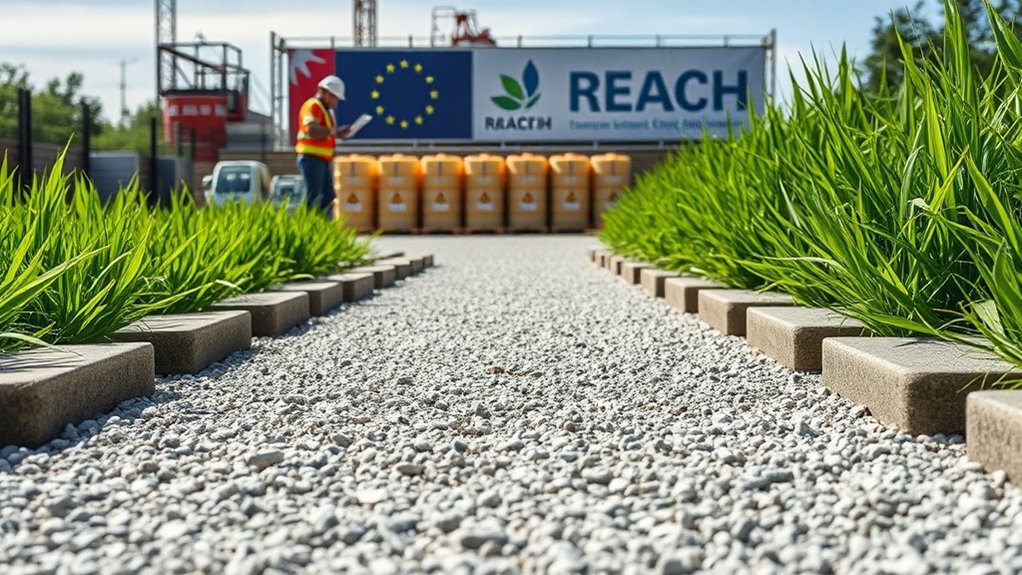
REACH regulations for diisocyanates now affect resin-bound gravel installations across the UK. Since 24 August 2023, stricter controls apply to products containing over 0.1% monomeric diisocyanates – the key ingredients in polyurethane binders used for resin surfaces.
For UK contractors, this means:
- All team members must complete mandatory safety training
- Training must cover health risks and proper handling
- Focus on preventing breathing problems and skin reactions
- Updated Safety Data Sheets must be followed
- Proper ventilation and protective gear are essential
Think of diisocyanates like strong household chemicals – they’re safe when handled properly but need careful management. Your team should treat these materials with the same caution as working with industrial cleaners or strong adhesives. Additionally, comprehensive training is crucial to ensure all workers understand the associated risks and safe handling practices.
To stay compliant, keep training records up to date and ensure your workplace has proper safety measures in place. This isn’t just about ticking boxes – it’s about protecting your team whilst delivering quality resin-bound installations.
The Importance of SUDS Compliance in Resin-Bound Installations
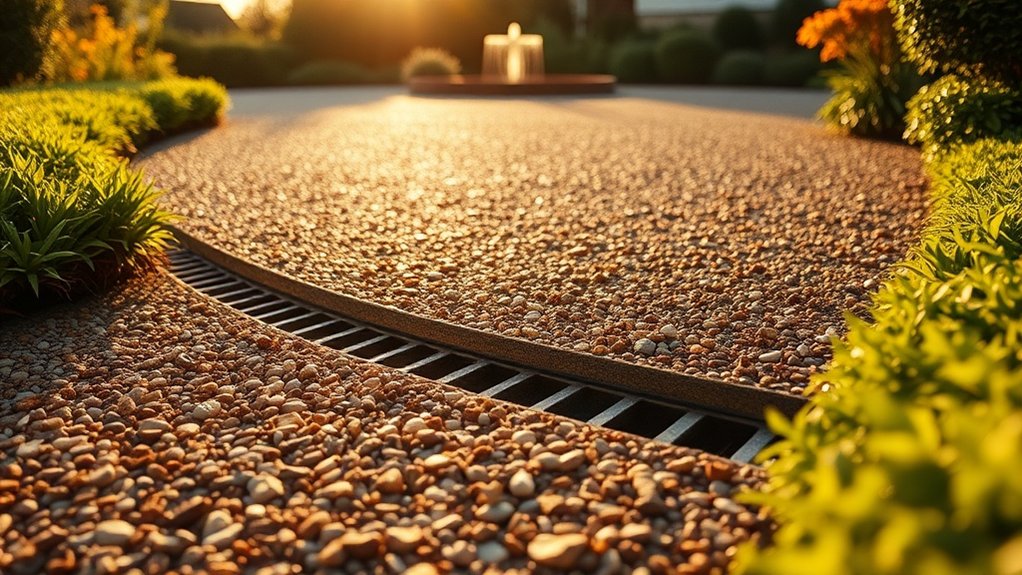
SUDS compliance is crucial for resin-bound installations across the UK. These regulations ensure proper drainage and help prevent urban flooding – a growing concern in British towns and cities.
Think of your resin-bound surface as a giant sponge: it allows rainwater to soak through naturally rather than creating puddles or overwhelming storm drains.
To meet SUDS requirements, you’ll need a proper foundation. A MOT Type 3 sub-base works well, creating the right balance of stability and water permeability. The system filters rainwater as it passes through, improving water quality before it reaches the ground. This ensures that the surface is SUDS-compliant, enhancing its effectiveness in managing surface water. As a result, compliance with Sustainable Drainage Systems adds value to your installation by demonstrating environmental responsibility.
Getting SUDS compliance right makes planning permission easier and shows you’re serious about sustainable construction. It’s particularly relevant for British weather conditions, where regular rainfall means effective drainage isn’t just nice to have – it’s essential.
Most importantly, a SUDS-compliant resin-bound surface protects both property and environment, making it a sound investment for any outdoor installation project.
Navigating Planning and Building Regulations
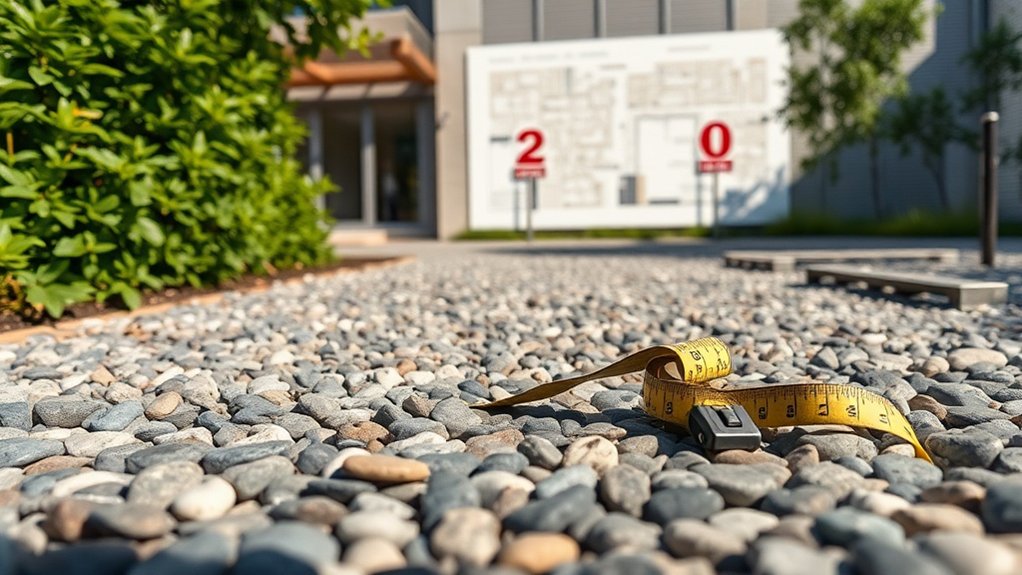
Navigating planning rules for resin-bound gravel in the UK is simpler than you might think. You typically won’t need planning permission if your surface is permeable and allows natural drainage. Think of it like a sponge – water should soak through rather than run off.
Converting your front garden to a driveway? You’ll likely need approval if it affects pavement access or crosses a public footpath. A quick check with your local council will clarify the requirements for your area. Ensuring SUDS compliance is essential to mitigate flood risks and maintain environmental protection.
Keep in mind that rules vary across different councils. For instance, properties in conservation areas often face stricter regulations. Make sure your materials meet local environmental standards – most suppliers can provide this documentation. Additionally, a professionally installed resin-bound surface is essential for long-lasting results and ensures compliance with local regulations.
The key is proper drainage. A well-installed resin-bound surface helps prevent flooding and meets sustainable urban drainage system (SUDS) requirements.
Sort these details early, and you’ll avoid headaches later.
Base Material Regulations and Requirements
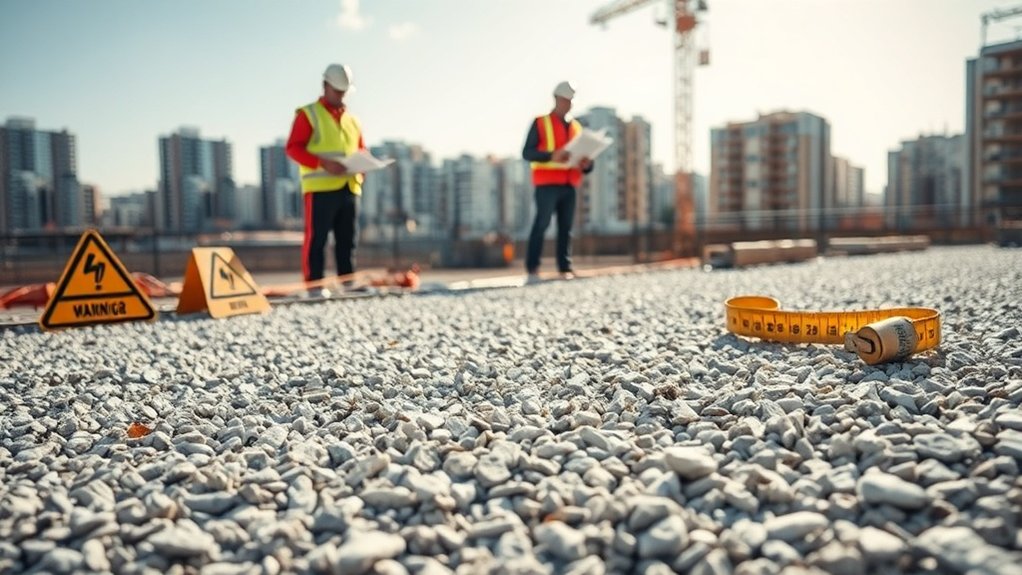
Base materials for resin-bound gravel must meet strict UK standards for both structure and drainage. Common options include:
- Concrete
- Open-graded tarmacadam
- MOT type 3 aggregate
- Permeable sub-base mixes
Required measurements:
- Sub-base depth: 100-250mm
- Concrete slab thickness: minimum 100mm (strength: 25-35 N/mm²)
- Resin-bound surface: 15-18mm
For SuDS compliance, choose permeable materials that allow proper water drainage. Think of it like a sponge – the base needs to soak up water rather than let it pool on top. This approach prevents flooding and extends the life of your driveway or patio. Additionally, ensuring proper drainage compliance is crucial in preventing issues like flooding and prolonging the surface’s durability.
Poor drainage leads to common problems like puddles and frost damage, whilst proper drainage keeps your surface looking smart and functioning well year-round.
Environmental and Sustainability Considerations
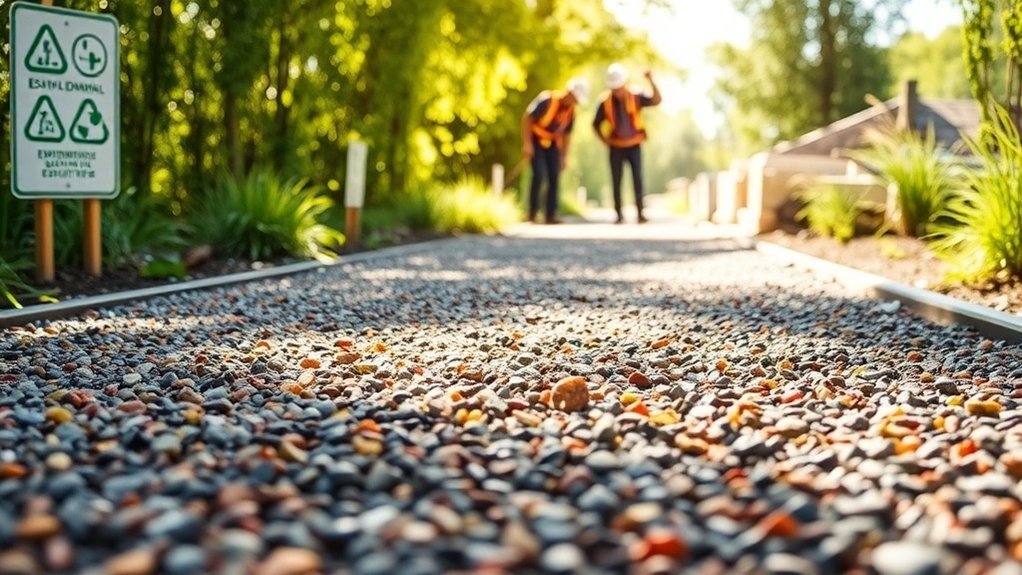
Choosing eco-friendly base materials for resin-bound gravel makes sound environmental sense.
Using at least 25% recycled aggregates cuts down on quarrying and waste, whilst supporting British suppliers and reducing transport miles.
These systems work brilliantly with SUDS requirements, helping manage urban flooding through natural water drainage.
With a solid 15-25 year lifespan, you won’t need frequent repairs or replacements, saving both materials and money.
It’s a practical way to build sustainably, especially in UK towns and cities where green infrastructure matters most.
Health and Safety Regulations in Resin-Bound Projects
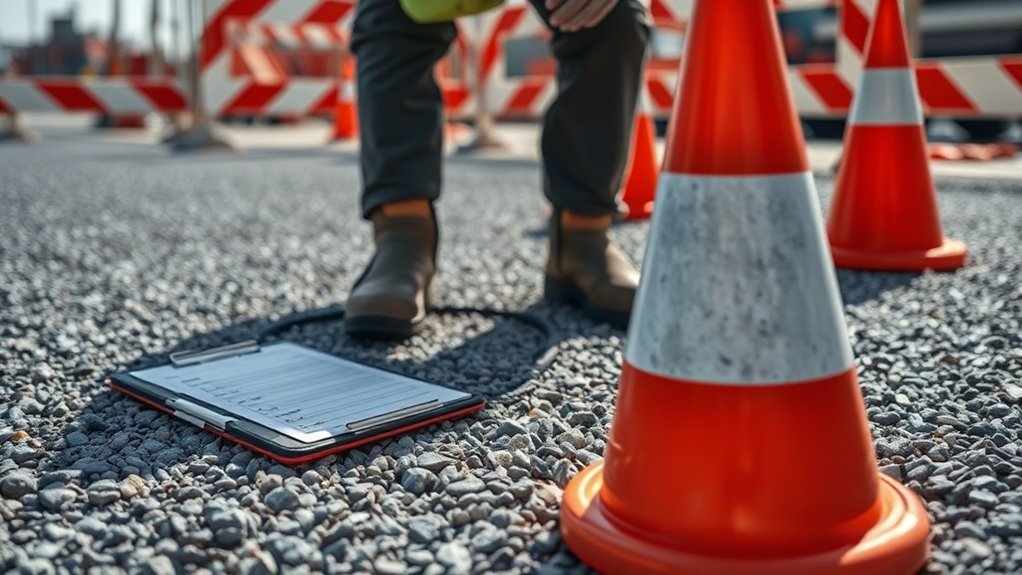
Essential health and safety measures must be in place for resin-bound installations in the UK. Workers need proper PPE, including protective gloves, masks and eye protection – much like you’d gear up for painting or working with strong chemicals at home.
All installers must understand REACH regulations, particularly regarding diisocyanates (the chemicals that make resin bind). Think of it like handling strong cleaning products – you need to know what you’re working with.
Only use BBA-certified materials and follow FeRFA guidelines to ensure quality. Before starting, complete a proper risk assessment – just as you’d check for hazards before DIY work at home.
Weather conditions matter: installation needs the right temperature and humidity to prevent defects. Keep Safety Data Sheets on-site and know how to handle spills. It’s like having a first aid kit – you hope not to need it, but it must be there.
These aren’t just box-ticking exercises; they protect your team and ensure the job’s done right. A safe site is an efficient site.
Frequently Asked Questions
What Are the Long-Term Benefits of Resin-Bound Surfaces?
Resin-bound surfaces deliver outstanding longevity, typically lasting 15 to 30 years – perfect for British weather conditions. They’re remarkably low-maintenance, with no loose stones to sweep up like traditional gravel drives, and they resist cracking even during harsh winters. Think of them as a fit-and-forget solution for driveways, paths and patios across the UK.
How Can I Verify a Contractor’s Compliance With Regulations?
Check a contractor’s compliance by reviewing their licences, qualifications and insurance documents. Request proof of relevant training certificates and professional memberships – for instance, Gas Safe registration for heating engineers or NICEIC certification for electricians. Verify they follow current UK building regulations and health and safety protocols. Ask for references from previous jobs and confirm they’re registered with appropriate trade bodies like the Federation of Master Builders or similar organisations.
What Is the Typical Lifespan of Resin-Bound Installations?
Resin-bound surfaces typically last 15-30 years when properly installed and maintained. Quality materials and proper care can extend this lifespan, much like a well-maintained garden path or driveway. Regular sweeping and occasional pressure washing will keep the surface in top condition, whilst poor maintenance or heavy traffic (such as frequent HGV use) could significantly reduce its durability.
Are There Specific Warranties for Bba-Certified Products?
BBA-certified products typically come with warranties lasting 5-21 years, backed by thorough testing. Whilst the certification ensures quality, your warranty remains valid only with correct fitting and upkeep. Think of it like a new boiler warranty – you’ll need proper installation and regular servicing to maintain coverage.
How Does Weather Affect Resin-Bound Installation Timing?
Weather plays a crucial role in resin-bound installations. Best results come from laying in temperatures between 5°C and 25°C – think typical British spring or autumn days. You’ll want dry conditions, much like waiting for the perfect day to paint your garden fence. Too much moisture or extreme humidity can mess up how well the resin bonds and cures. For UK weather, early morning installation often works best, avoiding both the midday heat in summer and evening damp in cooler months.
Conclusion
Getting to grips with regulations is vital for resin-bound gravel installations in the UK. Local data shows proper SUDS compliance cuts surface water flooding by up to 30%. Following REACH guidelines for diisocyanates, meeting planning requirements and maintaining strict health and safety standards ensures your project is both legally sound and sustainable. Clear understanding of these rules leads to safer, greener installations that meet British standards.
